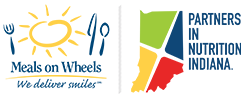Access to food, specifically nutritious food, is regarded as a key social determinant of health that has a direct impact on a person’s well-being. Social determinants of health include access to nutritious food, proper care, safe housing, reliable transportation, and community supports. These underlying drivers of health impact every part of our physical, mental, and social well-being. When they work against someone or are left unaddressed, they create health inequities – which leads to worse outcomes and more expensive care.
A nutritious diet is considered a critical pathway in influencing chronic conditions such as hypertension, diabetes, cardiovascular disease, cancer, and obesity. Those who cannot afford or obtain quality food run the risk of developing these conditions or exacerbating illnesses they may already have, and this occurs in minority communities disproportionately. In Marion county alone, 32% of the black population lives in a food desert and there was a 15% increase in Hispanics living in food deserts as compared to 18% of white residents. “It is unacceptable for anyone to suffer from poor health because they can’t get enough nutritious food to eat,” said the late Bernard J. Tyson, former chairman and CEO of Kaiser Permanente.
And now, as the COVID-19 pandemic exacerbates the financial and logistical challenges in accessing food, programs such as Meals on Wheels of Central Indiana are thrust to the front lines as a critically necessary resource. Through our Food is Medicine approach, we address not only the basic food access needs of our clients, but our medically tailored meals combat against some of the very social determinants of health that brought our clients to need us in the first place. For example, Meals on Wheels clients receive meals that are prescribed by their physician, taking out the guesswork when trying to meet their dietary needs. Most special diets can be accommodated (i.e. heart healthy, diabetic, low sodium, renal, etc.). The stressors of finding nutritious food day in and day out have been eliminated because the delivered meals have been medically-tailored to suit the client’s dietary requirements. With recent implementation of a “no-touch” delivery protocol, PINI is creating a safer home for the client by limiting outside exposure to COVID-19; and additionally, reducing the needs of personal transportation.
References:
